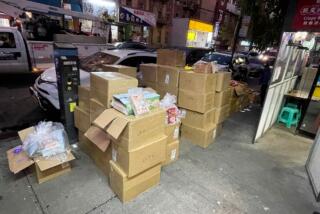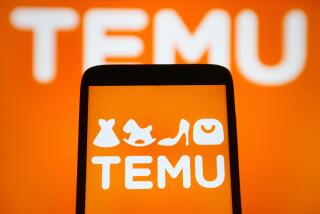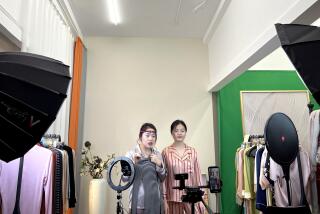China says its foods are safe
- Share via
BEIJING — With shelves stocked with products including cooking oil, milk, tea, soy sauce, shampoo, vitamins and bandages, the showroom looks like a mini-supermarket.
But none of the items are for sale -- they are all fake goods confiscated by the Chinese government in its uphill battle to tackle food safety problems and reduce counterfeiting.
Stepping up their damage-control efforts after a recent slew of scandals involving tainted food and drugs, Chinese officials Tuesday showed off the seized goods to a gaggle of Chinese and foreign journalists and said consumers need not be wary of the “Made in China” label. They also invited reporters to a food safety lab and discussed their efforts to find and test products for harmful ingredients.
“Yes, we have had some problems with the food safety of Chinese products. However, they are not that serious,” said Li Dongsheng, vice minister of the State Administration for Industry and Commerce.
“We should not exaggerate those problems. We do not want to cause panic.”
As a major exporter to the world, China’s problems are increasingly felt on a global scale. Drugs laced with a harmful Chinese-made ingredient reportedly killed at least 100 people in Panama. Pet food ingredients from China also poisoned dogs and cats in the U.S. and triggered massive recalls. A toxic chemical was found in Chinese-made toothpaste exported to Central America.
The government said Tuesday that it had conducted more than 10 million food market inspections last year and discovered problems in 360,000 businesses, of which about half have been shut down. Without giving details, officials also said 16,000 tons of substandard food had been banned from the market.
To ensure food safety in the Chinese capital, especially in the run-up to the 2008 Olympics, officials say they test about 100,000 random samples each year from local supermarket shelves. Only about 5% don’t make the cut, said Lu Yong, a deputy director at the Beijing Food Safety Administration.
As he spoke, workers in white lab coats were shaking test tubes filled with bits of frozen wontons, spring rolls, pot stickers and scallion pancakes.
One technician who said she had been on the job for three years said she couldn’t recall a single food item she tested that was substandard.
“Food safety in Beijing is not a problem,” Lu said.
For those who feel otherwise, the government has set up a hotline to register their complaints and facilitate inspections. Last year, it received 4.6 million calls from around the country; about 63,000 cases involved food safety.
In Shanghai, officials have been holding food-safety forums in recent weeks and launching initiatives to reassure people that inspectors are cracking down on violators. They have even set up mobile food-safety labs -- blue-and-white Toyota minibuses equipped with a stainless steel kitchen for testing. At a cost of $250,000 each, they enable technicians to do spot checks on local markets.
“The situation is quite good,” said Peng Shaojie, deputy director of Shanghai’s newly established Food Safety Evaluation Center, as he watched an inspector test a slab of pork and spinach leaves. “There are over 50 tests we can do.”
Despite official reassurance, fresh scandals continue to rock consumer confidence. The most recent involved the use of fake blood plasma in 18 hospitals in northeastern China. The fake plasma contained no protein, which could result in serious harm to patients.
To help salvage China’s reputation and set a forceful example for officials, Chinese authorities two weeks ago sentenced the country’s top food and drug safety official to death for taking bribes from drug companies and allowing substandard products to pass inspection.
At the same time, Beijing has been on the offensive to point out that poor food safety is not just a Chinese phenomenon. Last week, China rejected shipments of California pistachios and golden raisins, saying they contained ants and sulfur dioxide, which is sometimes used as a preservative for dried fruit. Just before that, Beijing seized five containers of Evian and said the French bottled water contained high levels of bacteria.
“Businesses from every country want to make money and every country has bad businesses that break the law,” said Zhang Guohong, an official at the brand protection department of the Beijing Food and Safety Administration, standing in front of stacks of chili sauce, dried tofu, chicken powder and Scotch whiskey, all fake. “As a Chinese consumer I trust that goods sold in big supermarkets are real and I am happy to shop there.”
Zhang acknowledged, however, that it could be difficult for consumers to tell the difference between genuine and counterfeit products.
“This for example is a fake brand, but it is not fake milk,” said Zhang, pointing at boxes of “breakfast milk” made to look like a popular Chinese brand. “It won’t kill you or make you sick.”
Times staff writer Don Lee in Shanghai contributed to this report.
More to Read
Sign up for Essential California
The most important California stories and recommendations in your inbox every morning.
You may occasionally receive promotional content from the Los Angeles Times.










